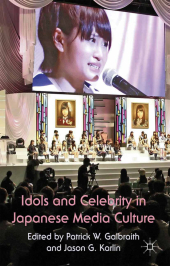 Neuerscheinungen 2012Stand: 2020-01-07 |
Schnellsuche
ISBN/Stichwort/Autor
|
Herderstraße 10
10625 Berlin
Tel.: 030 315 714 16
Fax 030 315 714 14
info@buchspektrum.de |

Patrick W. Galbraith, J. G. Karlin
(Beteiligte)
Idols and Celebrity in Japanese Media Culture
Herausgegeben von Galbraith, Patrick W.; Karlin, J. G.
2012. xv, 239 S. 216 mm
Verlag/Jahr: SPRINGER PALGRAVE MACMILLAN 2012
ISBN: 1-349-33445-6 (1349334456)
Neue ISBN: 978-1-349-33445-2 (9781349334452)
Preis und Lieferzeit: Bitte klicken
This is the most complete and compelling account of idols and celebrity in Japanese media culture to date. Engaging with the study of media, gender and celebrity, and sensitive to history and the contemporary scene, these interdisciplinary essays cover male and female idols, production and consumption, industrial structures and fan movements.
Forward: Revisiting ´Idology´; H. Aoyagi Introduction: The Mirror of Idols and Celebrity; P.W.Galbraith & J.G.Karlin PART I: SYSTEMS The Jimusho System: Understanding the Production Logic of the Japanese Entertainment Industry; W.D.Marx Megaspectacle and Celebrity Transgression in Japan: The Sakai Noriko Media Scandal; I.Prusa Through a Looking Glass Darkly: Television Advertising, Idols and the Making of Fan Audiences; J.G.Karlin PART II: DESIRE Johnny´s Idols as Icon: Female Desires to Fantasize and Consume Male Idol Images; K.Nagaike From Boys Next Door to Boys´ Love: Gender Performance in Japanese Male Idol Media; L.Glasspool The Homo Cultures of Iconic Personality in Japan: Mishima Yukio and Misora Hibari; J.D.Mackintosh PART III: DIFFERENCE Idol as Accidental Activist: Agnes Chan, Feminism and Motherhood in Japan; A.Hambleton Emotions, Desires and Fantasy: What Idolizing Means for Yon-sama Fans in Japan; Ho Swee Lin PART IV: IMAGE Idols: The Image of Desire in Japanese Consumer Capitalism; P.W.Galbraith The Virtual Idol: Producing and Consuming Digital Femininity; D.Black Index
´Idols and Celebrity in Japanese Media is a wonderful anthology that offers an overview of media culture, idols, and celebrity in Japan through intriguing case studies whose topics range from the entertainment industry to idols to otaku to the digitally created idol. The book´s greatest strength is that, despite its narrow focus on Japan, the authors´ insights and discussions can be applied to other countries in the global context of the ongoing intensification of capitalism and consumerism. Overall, the book provides an excellent introduction to the social, cultural, and economic issues intertwined with media culture.´ - Jungmin Kwon, International Journal of Communication 8 (2014)


